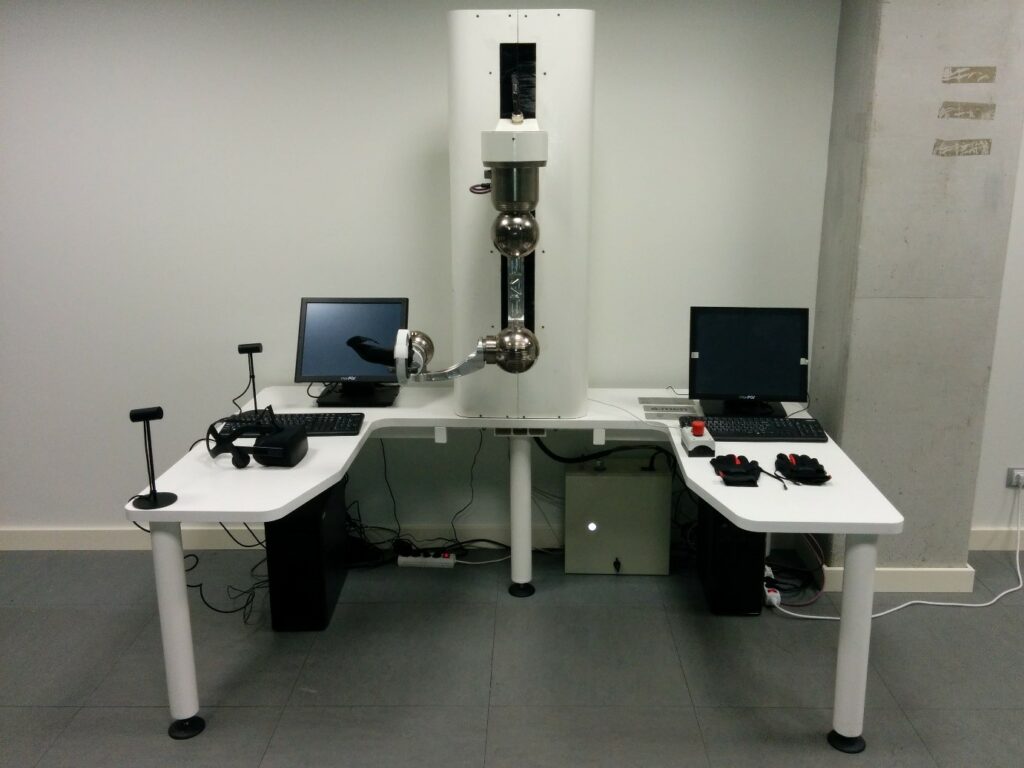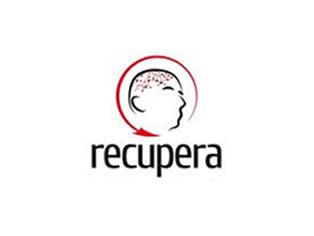Recupera to develop a new solution combining robotics and virtual environments to restore brain-damaged patients’ functionality -in852a 2016/160
- The RECUPERA project is a follow-up to the FISIOROB project in which a first functional prototype was developed to ensure the feasibility of using a robotic solution in rehabilitation sessions.
- As part of the ConectaPEME 2016 Programme, the project consortium is led by BALIDEA and completed by the companies POVISA, DGH, FICCION and I3TE. AIMEN participates as a collaborating entity.
- This new concept of rehabilitation therapy will reduce the patient’s recovery time compared to conventional therapy by 25%.
The RECUPERA project proposes a new solution, based on the combination of robotics with immersive virtual rehabilitation environments, for use in the recovery of upper limb mobility in patients with neuromotor rehabilitation needs, whose main objective is to be able to carry out clinical trials on people with neurological pathologies.
RECUPERA was created as a follow-up to the FISIOROB project where a first functional prototype has been developed to ensure the feasibility of using a collaborative robotic solution together with virtual reality in rehabilitation sessions.
This modular robotic system will assist patients at all stages of recovery, from the most critical stage when the patient has no appreciable neuromotor ability, through the stage where there is movement ability but no endurance, to the pre-discharge phase when the patient has sufficient movement ability but little motor control
Key Milestones Achieved
This last year of the project saw the end of development, focusing on the integration of the main subsystems, achieving a fully functional prototype that combines the development of the main pillars on which RECUPERA is based: a Virtual Reality environment with advanced exercises, an inertial sensor system for 3D localisation, improved control and a computer system that integrates control, graphic interface and database storage.
FICCIÓN PRODUCCIONES has worked on the finalisation of the virtual reality environment, as well as on completing all the exercises that were proposed at the beginning of the project. The final outcome of the exercises has given a high degree of realism to the environment where each of them takes place.
I3TE completed the hardware development of the inertial sensors that make it possible to locate the healthy arm in space, as well as the real objects that can be used in the exercises defined for this purpose. Likewise, the software part was implemented with the aim of filtering the measurements acquired and achieving the necessary precision in the localisation.
BALIDEA worked on the finalisation of two important developments within the project. Firstly, the graphic interface was optimised and evolved to achieve the objectives defined at the start of the project. In addition, the database responsible for storing the results of each exercise, for subsequent analysis and comparison between patients, was also finalised. BALIDEA has managed to develop a new video analysis system applied to rehabilitation therapies as a second development.
With AIMEN’s support, DGH focused on modifying and optimising the robotic arm movement, adapting it to the existing space for each exercise, which is relatively small, requiring low movement speeds and high precision. In addition, the optimisation achieved has reduced the learning time for new patients.
Tests have been carried out this year with healthy people to demonstrate that the device shows objective information on kinetic and kinematic values, that it is not harmful and that the parameters can improve with training. Furthermore, thanks to these tests, behavioural patterns will be generated that will allow comparisons between real patients and data from healthy people.

Cross-sector collaboration
The RECUPERA project is part of the ConectaPEME 2016 Programme, with a budget of €1.33 million and a total duration of 34 months.
Led by BALIDEA (an ICT company that develops and integrates software in healthcare environments), the consortium is made up of DGH (an engineering company that develops industrial robotised solutions), FICCION (an entity dedicated to audiovisual production and the design of visual environments), I3TE (an engineering company that develops customised solutions for simultaneous signal acquisition) and POVISA (the most important private hospital in Spain, which will be in charge of the clinical validation of the system developed).
This group of companies has the support of AIMEN Technology Centre.
Partners:


Collaborating entity:

Financing:

Feder co-funding, OT1 “Promote technological development, innovation and quality research”, P.O Feder Galicia 2014-2020
